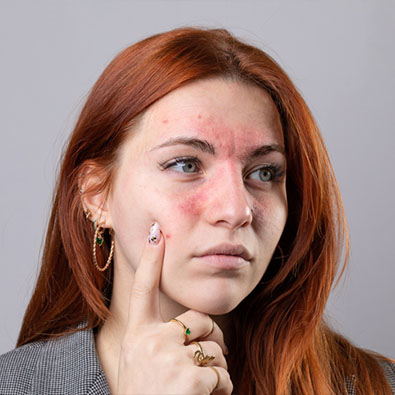
Symptoms Of Alcohol Intolerance And How To Treat Them
While drinking alcohol is rarely associated with feeling your healthiest, you may be wondering if the discomfort you feel after drinking means you have an “allergy” to alcohol. What are the symptoms of alcohol intolerance? Are any treatments available? Keep reading to learn more!
Table of Contents:
What is alcohol intolerance?
People who experience alcohol intolerance genetically lack an enzyme that’s necessary to break down alcohol properly. Like lactose intolerance, alcohol intolerance is not a true allergy, though it should be noted some people may be allergic to alcohol if allergic to its ingredients, like chemicals, grain, or preservatives.
This genetic trait is most prevalent in those of Asian descent. Symptoms may worsen if alcohol is combined with certain other drugs or substances.
Symptoms of alcohol intolerance
You may suffer from alcohol intolerance if you experience the following symptoms:
- Alcohol flushing syndrome causes your face, chest, and neck to become red or pink and feel warm
- Nausea, vomiting, diarrhea
- Hangover-like symptoms such as severe headache and fatigue
- Rapid heartbeat or heart palpitations
- Low blood pressure
- Stuffy nose
- Asthma getting worse
If you believe you may have alcohol intolerance, you can talk to a healthcare provider about taking an ethanol patch test to confirm your allergy.

This test simply involves taping a gauze pad containing ethanol on your arm for several minutes to see if it causes any reaction.
Treatment for symptoms of alcohol intolerance

Unfortunately, there is no specific treatment or cure for alcohol intolerance. The only way to avoid and relieve the symptoms of alcohol intolerance is to avoid drinking. It is an inherited, lifelong condition.
Continuing to drink despite having an alcohol intolerance can put you at risk for more serious health issues later, such as:
- Mouth and throat cancer
- Alzheimer’s disease
- Liver disease
Safe alcohol detox
If you drink regularly prior to receiving an alcohol intolerance diagnosis, it’s important to be aware of alcohol withdrawal symptoms. Drinking alcohol regularly and/or in excess can prompt changes in your brain chemistry; ceasing drinking will cause your body to react as it adjusts, resulting in withdrawal – even if your symptoms of alcohol intolerance improve.
The severity of alcohol withdrawal depends on a number of factors, ranging from age and overall health to your drinking history. Detox symptoms usually begin within 6 hours of your last drink and may last for up to a week. More minor symptoms can persist for up to a month.
Those who drink heavily over an extended period of time, with certain medical conditions, as well as those who consume alcohol with other drugs or substances are at higher risk of developing extremely serious withdrawal symptoms known as Delirium Tremens (DTs). DTs can be fatal if left untreated, so it’s extremely important to contact emergency services if you experience symptoms such as:
- Extreme confusion or agitation
- Fevers or high blood pressure
- Visual, auditory, or physical hallucinations
- Seizures

Why medically managed detox is safer and more comfortable
Healthcare experts specializing in addiction can evaluate your overall health and drinking habits to work out a plan that keeps you safe from the most dangerous symptoms of alcohol withdrawal. They can prescribe medication to help prevent seizures and help relieve some of the more uncomfortable symptoms of detox to the extent possible.
When most people think of addiction healthcare, they usually think of traditional 30-day programs offered by clinics. These clinics offer a combination of individual and group therapy to help people work through triggers and learn to cope without turning to alcohol. While many people benefit from these programs, others who have tried traditional detox programs to improve symptoms of alcohol intolerance may need another option.
Some people are concerned about explaining a prolonged absence and the stigma of addiction they could face as a result. Others have difficulty applying techniques learned in a clinic to real life problems. People with these concerns may want to consider in-home addiction healthcare services.
Elite Home Detox Can Help You Reduce Drinking To Relieve Symptoms of Alcohol Intolerance
If you’re struggling to quit drinking and suffer from symptoms of alcohol intolerance, Elite Home Detox can help. Our addiction experts will come to your home and work with you to design a detox and recovery plan. During detox, a healthcare professional will remain onsite to ensure your safety and monitor your progress.
As you face detox and triggers, you will learn techniques to cope with the support of an expert who understands the challenges you face. Our medical team also offers addiction-focused healthcare services, which means we know how to reduce or relieve the most uncomfortable withdrawal symptoms you may face.
Elite Home Detox is one of the most discreet ways possible to reclaim your life, relieve your alcohol intolerance symptoms, and feel your best. Reach out today!



 Erika Kamish is a nationally board-certified physician assistant licensed by the California Physician Assistant Committee. With over 6 years of experience in addiction medicine and primary care, she reviews Elite Home Detox content for medical accuracy and patient-centered care.
Erika Kamish is a nationally board-certified physician assistant licensed by the California Physician Assistant Committee. With over 6 years of experience in addiction medicine and primary care, she reviews Elite Home Detox content for medical accuracy and patient-centered care.